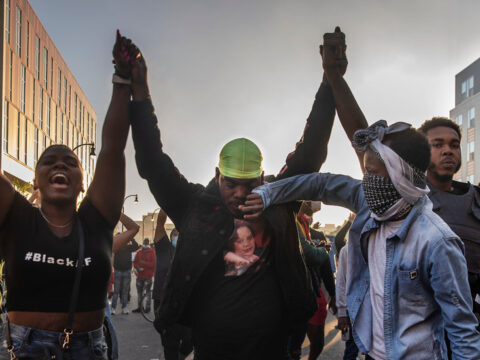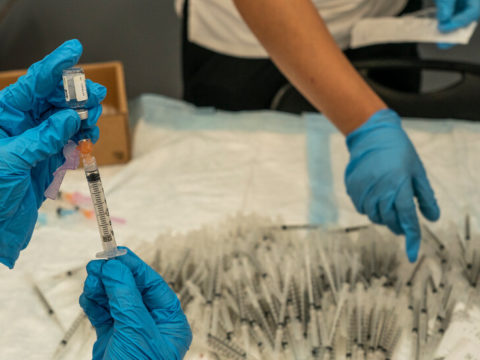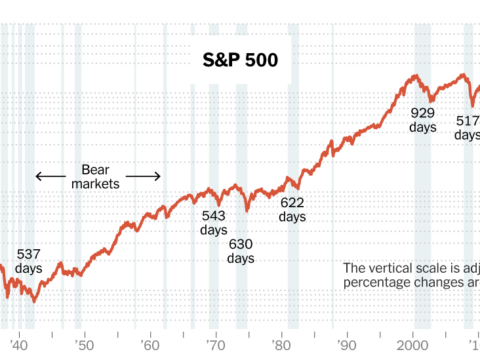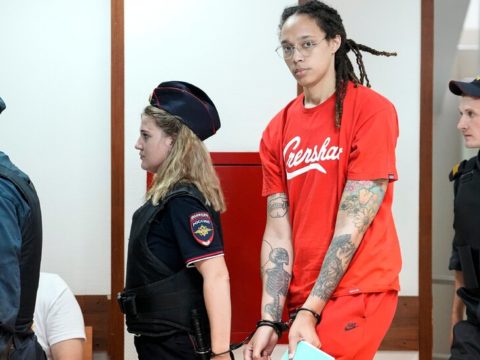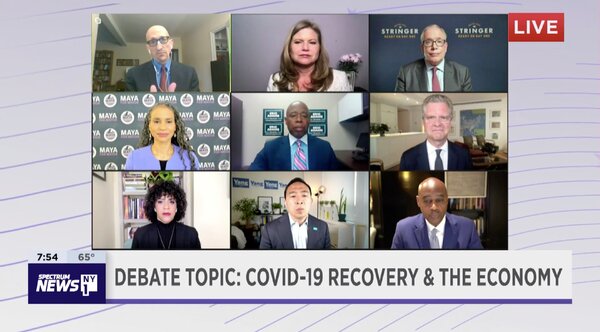
Key Updates:
-
May 13, 2021, 8:43 p.m. ET
Andrew Yang was put on the defensive about his voting record and his role in Georgia Senate election.
-
May 13, 2021, 8:40 p.m. ET
Scott M. Stringer says he welcomes an investigation into sexual assault allegation.
-
May 13, 2021, 8:28 p.m. ET
“We would hate to use the mute function on anyone”: Virtual debate leads to some awkward moments.
-
May 13, 2021, 7:48 p.m. ET
Candidates divided on ‘defund the police’ issue as shooting and homicides rise in New York City.
covers New York City education
Some of the candidates struggled to answer directly when asked how they would desegregate the city’s school system, which is one of the most racially segregated in the country. Donovan spoke about housing segregation and Yang largely dodged the topic. Garcia was more specific, saying she would expand the number of high schools, and Wiley said she would diversify the teaching corps. Morales has the most aggressive plan, including getting rid of all academic requirements for competitive middle and high schools.

Andrew Yang, who has been criticized multiple times during the campaign for being out of touch with New York City voters, found himself on the defensive once again during the debate, when Erroll Louis, the moderator, pressed him on the fact that he had not voted in several local elections.
Mr. Yang said that he was among a large group of New Yorkers who did not vote in local elections, and that he wanted to now “step up in new ways” to help the city.
“I’m not someone who thinks that all of the energy and ingenuity in our city lies in government agencies,” he said.
Mr. Louis then pointed out that some suggested that Mr. Yang has did not vote in the razor-thin 2000 presidential election, which Mr. Yang denied.
And when Mr. Yang asserted next that he helped Democrats win the Georgia Senate seats this year, he came under fire again, this time from another candidate, Eric Adams, who in many polls appears to be vying with Mr. Yang for the top spot.
Mr. Adams said Mr. Yang’s statements were disrespectful and “appalling” to “Stacey Abrams and those Black woman who organized on the ground.”
Mr. Yang said that he gave full credit to Ms. Abrams and other organizers. But he said he helped raise millions of dollars for the races, and it was “OK for other people to contribute to their success.”
Mr. Adams then launched another attack at Mr. Yang, pointing out that he held a news conference about a shooting near his home, but not for numerous other shootings around the city, where the victims were Black or Latino.
Mr. Yang, agreeing that many shooting victims were Black or Latino, said that the city needed to “work with leaders in those communities” to cut down on the violence.

covers crime and policing in New York City
Dianne Morales got a question from Kathryn Garcia about what the next mayor should do for the LGBTQ community. Morales says it should be a priority to make sure they feel safe, which includes decriminalizing sex work and paying attention to the dangers facing Black transgender people.

covers New York City
Maya Wiley sends out an email blast “factchecking” Eric Adams’ denial that he never defended stop-and-frisk, a pivotal issue in the 2013 campaign that continues to be relevant. Wiley quotes Adams from a CBS New York story: “Used it, used it often, great tool. We should have never removed stop-and-frisk.”

Scott M. Stringer said he welcomed an investigation into a sexual assault allegation he is facing from a former campaign worker.
Mr. Stringer, currently the city comptroller, said that it’s important to allow “women to step up and say what they have to say” when asked by the lead moderator, Errol Louis, whether his argument to voters is “please trust me.”
Mr. Stringer has vigorously denied the allegation and has tried to discredit the allegation from Jean Kim, a lobbyist, who has requested an investigation from the state attorney general.
The allegations have roiled Stringer’s campaign just as he was gaining momentum in the crowded field. Stringer compared his situation to that of President Biden, who was accused of sexual abuse by former aide Tara Reid.
Stringer has fought to keep his campaign afloat following the allegations. While Stringer was quickly abandoned by the progressive coalition that he had assembled, his labor coalition has stuck by him.
The influential United Federation of Teachers, the local branch of the American Federation of Teachers, is backing a $4 million super PAC to bolster Mr. Stringer’s candidacy with television ads.

Even though New York City is home to the country’s largest school system, education is rarely a major issue in mayoral races and this year is no exception. None of the leading candidates have so far focused on a major education topic, as Mayor Bill de Blasio did with universal prekindergarten during his 2013 campaign.
The candidates have been pressed frequently to explain how they would confront entrenched segregation in city schools.
They are divided on whether to keep the admissions exam that dictates entry into the city’s top public high schools, like Stuyvesant High.
Candidates in the progressive lane, including Comptroller Scott M. Stringer, Dianne Morales, a nonprofit leader, and Maya Wiley, a former de Blasio counsel, have said they would get jettison the test, while most of the other candidates have said they would keep it in some form.
Andrew Yang, a former presidential candidate, Borough President Eric Adams of Brooklyn and Kathryn Garcia, the former sanitation commissioner, have said they would expand gifted and talented classes, which are starkly segregated. Some experts have said doing so would only exacerbate disparities.
Most of the leading candidates have made clear they want the school system to fully reopen for normal, in-person instruction for all 1 million students this fall, which is what Mr. de Blasio has been promising for months.
None of the candidates have offered specifics on how to accomplish that beyond what Mr. de Blasio has announced. More details on the fall reopening plan are expected in the next few weeks.

covers crime and law enforcement in New York City
Adams says he plans to keep carrying his gun, as mayor, as long as his security teams believe it isn’t a threat. He’s allowed to do that because he’s a former police officer — retired police are part of a very, very small group of people who are even permitted to carry guns in the city.

covers transportation and infrastructure in the New York area
Andrew Yang says New York City’s tech sector needs more racial balance. He says “we all know” what it looks like, without elaborating on what he would do to improve the diversity of tech startups and other private companies,

covers crime and policing in New York City
Maya Wiley goes after Eric Adams, asking how New Yorkers can trust him when he supports the police use of stop-and-frisk, the controversial street-stop program that at its height led to nearly 700,000 stops of mostly Black and Hispanic young men. In a tense exchange, Adams says the question shows how little she knows about law enforcement.

covers national politics
In this round of questioning each other, the candidates must balance whether to ask tough and aggressive questions of their rivals, or positive ones to promote themselves. Some very different tactics on display. Stringer and Adams go tougher on Yang. Yang steered a positive one to Morales.

At the start of tonight’s debate, Errol Louis, the lead moderator, asked the candidates about policing in New York City. As each spoke, the others listened quietly, waiting for their moment to speak.
Then, Mr. Louis asked a question of all the candidates, and a cacophony of voices, apparently free from the silence of “mute,” crashed into each other.
Such was the nature of a virtual debate, where the eight participants sat in their homes or offices rather than hashing out policy positions on a stage.
The candidates in this year’s mayoral race have become experts at delivering stump speeches virtually, and their experience was clear. Eric Adams, Andrew Yang, Maya Wiley and Scott Stringer sat in front of campaign posters or backdrops, branding that helped remind voters of their names every time they were onscreen.
In the first hour, glitches were rare, though at one point Mr. Yang appeared to be stuck on mute.
But the format created some awkward interactions. During a section on reopening and the economy, Josefa Velasquez, another moderator, was struggling to keep candidates to their time limits.
As Shaun Donovan ran long, Ms. Velasquez tried to interrupt him, with little success. As she tried to move along, she scolded him lightly and issued a warning.
“We would hate to use the mute function on anyone,” Ms. Velasquez chided.

covers New York City politics
Andrew Yang and Eric Adams are getting a disproportionate number of questions from their competitors, a reflection of their frontrunner status in the race for mayor.

covers New York City
Yang asks Morales whether tax relief is a vital part of helping New Yorkers, citing his push for a universal basic income during his presidential campaign, signaling that the two candidates might actually be aligned on this significant issue. Morales calls for immediate tax relief but “it is not a long-term solution.”

covers crime and policing in New York City
Morales asks Adams what he would say to young people of color whose work she says is erased by his characterization of “defund the police” as a white-led movement. Adams says that he was not referring to the defund, but to “disband,” which he describes as being led by anarchists bent on having police departments dismantled.

covers crime and law enforcement in New York City
The residency issue with the N.Y.P.D. is a touchy subject among officers. They’re currently allowed to live in the five boroughs, Long Island and a handful of upstate counties. They aren’t allowed to live in the precinct they police. Residency data is something the department holds on to tightly, but some of it was released via an open records request in 2016 — at the time, around half of N.Y.P.D. officers lived outside the city.

covers New York City education
None of the candidates said they would require teachers and other staff members in public schools to be vaccinated. But Garcia, Stringer, Donovan and Yang indicated they believed eligible students should be required to get the vaccine, while the rest of the candidates indicated they should not. The mayor said earlier this week that the city would not require students to be vaccinated before the start of the new school year in September.

One of the more intractable problems the new mayor will face is homelessness, which has been growing for years and, under Mayor Bill de Blasio, taken on the aspect of a permanent emergency.
The numbers are daunting. By the start of the pandemic, 63,000 people — including more than 20,000 children — were staying in shelters, a tripling of the homeless population since the late 1990s. The average family in the shelter system now spends nearly 500 days there.
All this as spending on homeless services more than doubled under Mr. de Blasio to $3 billion, according to the Citizens Budget Commission of New York.
Since the pandemic began, the number of families in shelters has dropped sharply, largely because of an eviction moratorium that has been extended through August. But it will end eventually, and hundreds of thousands of tenants who collectively owe over a billion dollars in rent will face the threat of eviction.
The number of single adults in shelters, meanwhile, keeps rising. Part of this is because the city created thousands of private shelter rooms in hotels emptied by the pandemic, drawing many homeless people who typically chose the street over crowded, crime-ridden barracks-style shelters.
But as the city reopens to tourism, it will stop putting up the homeless in hotels. This may send many people back to the streets and subways, where a spate of high-profile crimes committed by homeless people — along with a spike in shootings — is already contributing to a perception that the city may be slipping back into lawlessness.
The biggest reasons for the crisis are simple: The city is woefully short on affordable housing and on the “supportive housing” that homeless people battling mental illness and substance abuse need to achieve stability.
All the major Democratic candidates told the advocacy group RxHome that they support a City Council effort to increase the value of city-sponsored rent vouchers, which are often not enough to pay for an apartment. Beyond that, their proposals are a grab bag.
Shaun Donovan, Kathryn Garcia and Andrew Yang say they would have one person overseeing the many city agencies that touch on housing and homelessness. Ray McGuire says he will shorten shelter stays by holding shelter operators responsible for moving people to permanent housing. Scott M. Stringer has promised 30,000 beds in supportive housing buildings, and Maya Wiley wants the city to buy vacant hotels and turn them into apartments.

covers New York City politics
Shaun Donovan says any concerns about a super PAC almost entirely funded by his father are irrelevant. His father has thus far pumped $5 million into the super PAC, which about twice as much as Donovan has raised in donations.

covers New York State politics
All the candidates raised their hands when asked if all future city police officers should be required to live in New York City.

covers New York City politics
Maya Wiley, who served as Mayor de Blasio’s counsel and provided him some legal advice that proved controversial, declines to take any responsibility for his missteps.

covers crime and law enforcement in New York City
Wiley brings up a now-infamous interview with De Blasio during the Floyd protests last summer, when he vigorously defended the N.Y.P.D.’s aggressive tactics and said folks shouldn’t believe everything they were seeing/hearing about police brutality during protests. (De Blasio later was forced to walk that back and apologize, after several internal investigations revealed the N.Y.P.D. had, in fact, mistreated peaceful protesters).

covers national politics
Debates are performative. And Maya Wiley, a TV commentator before her mayoral run, is skillful at interjecting herself and making her points efficiently when she does.

covers New York State politics
One hour in and no mention so far of how the candidates will work with New York’s governor, who wields substantial power over city matters, including its subway system. Most of the candidates have called on Gov. Andrew M. Cuomo to resign following sexual harassment allegations against him from multiple women.

covers New York City politics
Maya Wiley notes Eric Adams called himself a conservative Republican when Rudy Giuliani was mayor, which was reported in 1999 in The New York Times. Adams denies the veracity of the news story.

covers politics in New York City
Mr. Stringer has tried to keep his campaign afloat after a sexual assault allegation from a former campaign volunteer from 20 years ago. The progressive coalition that Mr. Stringer had assembled quickly abandoned him. But the labor coalition, including the influential United Federation of Teachers, has stayed with Mr. Stringer, even investing in a $4 million super PAC to purchase television ads supporting his candidacy.

covers national politics
The front-runners engage: Adams says Yang taking credit for Georgia runoff wins was “disrespectful and appalling,” adding, “He needs to stop saying that.” Yang credits Stacey Abrams but says he mobilized Asian-American voters, too, in a contest Democrats narrowly won.

covers New York City
Dianne Morales says Bill de Blasio “fell short” of the progressive vision he promised during his campaign. She pledges to be a mayor who can do both: tackle things like trash and public transportation, as well as address broader structural concerns like the health and safety of Black and brown New Yorkers.

covers politics in New York City
Eric Adams goes after Andrew Yang for claiming credit for helping Democrats win Georgia’s two Senate seats. Adams said that the real credit should go to Black women.

covers New York City politics
Andrew Yang suggests voters should not be dissuaded by the fact that he has never voted in a New York City mayoral election. He says he’s invested in New York City because he’s a public school parent, he walks city streets, and lots of Democrats don’t vote in local elections.

covers New York State politics
Many candidates have focused on the restaurant industry when asked how they would help small businesses. It’s not surprising: New York City restaurants were hard hit by the pandemic, with many closing for good and laden with debt even as capacity limits and curfews were lifted recently.

covers national politics
After nearly one hour, it appears Yang, who is the front-runner in the race’s limited polling, does not feel any urgency to butt into the conversation unless he is included. No one has swiped directly at him yet, either.

covers transportation and infrastructure in the New York area
The minimal discussion about big infrastructure projects reflects how little control the city has over much of its critical facilities like subways, commuter railroads and airports. Most of them are operated by state agencies like the M.T.A, and the Port Authority.

covers New York City politics
Kathryn Garcia says she would eliminate surprise inspections of restaurants, but allow them to schedule them in advance. She argues that very few people get sick from the food they eat in New York City restaurants.

covers New York City
One presumed benefit of ranked-choice voting is that it will discourage candidates from attacking each other, prompting them to form alliances to help them on the ballot. This doesn’t seem quite to be the case this evening.

covers climate and environment in New York
Surprised Stringer didn’t hit green jobs and his climate plan harder. That’s a signature issue for him and one of his few opportunities to hang on to some progressive votes after losing some endorsements over the sexual misconduct allegations.

covers politics in New York City
Eric Adams has been a stickler about time and opportunities to speak at many of the virtual forums over the last few months, so much so that he has come to be known as the “timekeeper” by several of his fellow mayoral candidates.

covers climate and environment in New York
Stringer plugs “green jobs” in renewable energy and retrofitting buildings to prevent flooding and reduce planet-warming emissions: “I’ll make sure we adapt to the green economy.” He says it will create 100,000 jobs. “It’s going to be bigger than the industrial revolution.”

covers New York City politics
Shaun Donovan returns to one of his favorite themes: That Ray McGuire, by virtue of working at Citigroup, helped create the 2008 housing crisis from which Donovan, as former federal housing secretary and budget director, helped the nation recover. McGuire responds that Donovan is “completely uninformed by the facts” and his side of the bank had nothing to do with the mortgage crisis.

The idea of “defunding” the police, which a year ago became a rallying cry after the murder of George Floyd, proved to be a contentious proposition during the debate, dividing the candidates along ideological lines, particularly as New York City reels from an uptick in crime.
“The police are going to be a core way for us to address the public safety concerns that so many New Yorkers have and let me be clear defund the police is the wrong approach for new city,” Andrew Yang, considered a more moderate candidate, said.
But Maya Wiley, who is viewed as a more progressive candidate, argued in favor of shifting resources away from the police.
“I’m going to take a billion dollars from the New York City Police Department and shift that money to create trauma-informed care in our schools, because when we do that violence goes down and graduation rates go up” she said.
Dianne Morales, also considered one of the more progressive candidates, said that “safety is not synonymous with police.”
“We actually need to recognize that police respond to crime they don’t prevent crime,” she said.

covers climate and environment in New York
Notably absent so far in the economic-recovery discussion: Any mention of a “Green New Deal”-style program of creating “green jobs” in industries and programs that reduce harm to the environment, slow climate change and protect against its impacts. Stringer, Wiley, Morales, Donovan and Garcia have talked about this often.

covers politics in New York City
Donovan and McGuire have repeatedly clashed for months. Donovan criticized McGuire for working at Citi during the mortgage foreclosure crisis and McGuire has criticized Donovan for mentioning his role in the Obama administration too often, calling him “Shaun Obama” at one forum.

covers New York City politics
Andrew Yang argues that one reason the city’s current public safety concerns could be so “disastrous” is because it risks scaring tourists away, and tourism is a pillar of New York City’s economy.

covers real estate in New York City
On the topic of the economic recovery of New York City, none of the candidates have mentioned the uncertain future of office buildings in Manhattan, home to the two largest central business districts in the country. Companies are embracing remote work and hybrid schedules — a monumental shift in how we work that will threaten the city’s economy for years to come.

covers transportation and infrastructure in the New York area
Andrew Yang is first to emphasize the need to rebuild the city’s tourism industry. He says he would spend even more than the $30 million that Mayor de Blasio has allocated for tourism promotion this year.

Office workers are still mostly at home. Broadway remains closed. Tourists have yet to return in anywhere close to their prepandemic millions.
Despite signs of revival on city streets as vaccinations take hold and New Yorkers venture out, the city’s recovery remains an open question that will likely be a key topic in the first official debate among the top Democrats vying to become the next mayor.
Even with some return of economic activity, the city had half a million fewer jobs this spring than a year ago, and citywide unemployment stood at nearly 12 percent in March, according to the state figures.
Perhaps the biggest unknown is the future of the city’s office districts, as at least some remote work is emerging as a legacy of the pandemic. The lack of a daily surge of office workers has kept small businesses struggling.
For many of the candidates, recovery does not mean a return to the New York of before. The pandemic has unleashed ambitious promises for substantial change at steep price tags.
Several have proposed some type of direct monetary assistance to those in need, including Andrew Yang, the former presidential candidate; the Brooklyn borough president, Eric Adams; and Dianne Morales, a former nonprofit executive.
Most candidates want to spend more money on parks and reduce fees and fines for small businesses. Several would make outdoor dining permanent.
Kathryn Garcia, the former sanitation commissioner, and Maya Wiley, the former counsel to Mayor Bill de Blasio, have proposed helping small businesses by adopting versions of a regulatory holiday — waiving fees, some taxes and other regulations — for their first year in office.
Ms. Morales wants the city to create a New Deal-style jobs corps, but with a focus on climate change; Scott Stringer, the city comptroller, has also proposed a major public works program for its aging infrastructure.
Raymond J. McGuire, a former Wall Street executive, has positioned himself as the candidate best able to use his relationships in the business community to help generate jobs. Shaun Donovan, a former federal and city housing official, has promised to create 500,000 jobs by the end of his first term.
Mr. Adams would expand a longstanding city tax incentive program aimed at luring new businesses to the city from out of state, the same program Amazon stood to benefit from by placing a headquarters in Queens before the company abandoned its efforts.

A spike in gun violence, random bias attacks against Asian New Yorkers and a series of attention-grabbing assaults on the subway have pushed crime and public safety to the front of the issues in the race for mayor.
In addition to addressing the increased violence, the next mayor will also face demands to downsize the Police Department and redirect funds from its large budget to social services and community programs to address the social conditions, like poverty, unemployment and mental illness, that contribute to crime.
Whomever succeeds Mayor Bill de Blasio will inherit the country’s largest police force at what is perhaps the most fraught moment for American policing in recent history.
Momentum from last summer’s George Floyd protests has ebbed and flowed over the last year, but the debate over the New York Police Department’s size, its budget and its role in the city has not faded.
The rise in gun violence coupled with the push for police reform present an interesting conundrum for mayoral candidates: How to appear tough on crime, while also meaningfully engaging with those who believe the force is too big, and too aggressive?
The candidates have all put forth plans with varying degrees of details about how they would make the city safer without discriminating against Black and Hispanic New Yorkers who have historically been the targets of enforcement.
Their ideas for curbing gun violence include reviving anti-crime units, expanding civilian-led intervention programs that mediate street conflicts, hosting gun buybacks and strengthening penalties for police misconduct.

Shaun Donovan, a self-described housing nerd, was the federal housing secretary under President Barack Obama and New York City’s housing commissioner under Mayor Michael R. Bloomberg.
Mr. Donovan, 55, has proposed creating 30,000 affordable housing units per year, investing $2 billion in repairs to the city’s existing housing stock and ensuring that every New Yorker lives within a 15-minute walk of school, health care and coffee shops. He has also vowed to create the city’s first-ever chief equity officer and to give every child $1,000 at birth.
He wants to significantly reduce the police’s and to appoint a police commissioner of color. He also says that he wants state lawmakers to pass legislation that would enable most convictions to be automatically removed from a person’s record after a certain period of time.
Despite his experience in housing policy, Mr. Donovan was unable to constrain the skyrocketing cost of housing in New York during his time in the Bloomberg administration, which prompted a surge in homelessness. He also recently drew criticism for incorrectly guessing, during an interview with The New York Times editorial board, that the median sale price of a home in Brooklyn is $100,000. (It’s $900,000.)

Raymond J. McGuire, one of the longest-serving and highest-ranking Black executives on Wall Street, is running for political office for the first time.
Mr. McGuire, 64, is a former Citigroup vice chairman, and his campaign has garnered support from business leaders who believe his experience managing billion-dollar transactions would help New York recover from the economic problems created by the coronavirus pandemic.
He is a political moderate who has issued plans for creating 500,000 jobs and reducing the cost of construction in the city so that 350,000 new units of housing can be built in the next eight years. He opposes the movement to defund the police, but he has also said that as a 6-foot-4-inch Black man he could “easily be the next George Floyd.”
Mr. McGuire has said he will appoint a deputy mayor for public safety and create a citywide emergency social services network to respond to mental health and substance abuse calls.

Maya Wiley is a civil rights lawyer who was counsel to Mayor Bill de Blasio and chair of the Civilian Complaint Review Board during his first term.
As a candidate, she has promoted a $10 billion “New Deal New York” plan that she says would create 100,000 jobs, finance public works and climate-related projects, create 10,000 affordable housing units and pay for the hiring of 2,500 new teachers.
Ms. Wiley, 57, has also pledged to redirect money from the Police Department to community-based groups to tailor their own violence-prevention programs, and to hire a civilian as police commissioner.
She has attracted support from liberal groups, but she has also been criticized for her stewardship of the review board, a police-oversight agency that some people have said became too secretive in its disciplinary procedures on her watch.
Ms. Wiley has also come under fire for creating a special designation — “agents of the city” — for Mr. de Blasio’s outside advisers during her tenure as counsel. The designation allowed the mayor for a time to keep his communications with those advisers confidential.

Eric Adams is among the most politically seasoned candidates in the race: Before being elected to his current job as Brooklyn borough president, he was a state senator. He began his career in the Police Department, rising to captain while pushing for reform as a result of his own experience being beaten by officers as a teenager.
Mr. Adams, 60, has run as a political moderate, opposing calls to defund the police while proposing to publicly identify officers whom the Police Department is monitoring for bad behavior. Other elements of his platform include giving New Yorkers a real-time ratings for how government agencies perform, appointing an “efficiency czar” and using drones to perform building inspections.
Some of Mr. Adams’s critics claim that he is too cozy with the real estate interests and have noted that he was a registered Republican from 1995 to 2002. He has also faced several ethics investigations, including one that found he violated conflict-of-interest rules by soliciting money for a nonprofit organization he controls from donors who had business with the city.

Kathryn Garcia was one of Mayor Bill de Blasio’s senior cabinet members until last fall, when she left her job as sanitation commissioner to prepare for her campaign for mayor.
Ms. Garcia, 51, has never sought elected office before, but she has extensive city government experience. At the Sanitation Department, she oversaw vast programs that are vital to making New York function, including trash collection and snow removal.
During her time in the city’s bureaucracy, Ms. Garcia developed a reputation as a go-to fixer during emergencies. She helped restore the city’s water systems after Hurricane Sandy in 2012, was chosen to temporarily lead the troubled New York City Housing Authority in 2019, and ran the city’s program for getting to food to hungry and vulnerable New Yorkers during the pandemic.
Ms. Garcia has campaigned on her expertise, but the message has not attracted widespread voter support, and some critics worry that she does not have the political experience necessary to run a city like New York.
Her campaign hopes a television ad and several recent endorsements, including that of the editorial board of The New York Times, can help push her to the top of the field.

Scott M. Stringer, the city comptroller, has worked in and around politics and government for decades. He served on a community planning board as a teenager and rose steadily through New York City’s Democratic ranks from there.
He was a district leader, a state assemblyman and the Manhattan borough president before defeating former Gov. Eliot Spitzer in the 2013 Democratic primary on the way to becoming comptroller.
Mr. Stringer, 61, has cast himself as both a progressive candidate and a seasoned government veteran who is prepared to “manage the hell out of the city” from his first day as mayor.
His bid has been complicated in recent weeks by an allegation of unwanted sexual advances, which he has denied. A number of progressive officials who had endorsed him no longer do, but he has retained some support from labor groups, most notably the teachers’ union.

Andrew Yang, who has a background in nonprofit management, rose to prominence last year as a presidential candidate with a platform that focused on providing a universal basic income to Americans.
Although he ranked low in the polls, Mr. Yang, 46, outlasted several candidates with more political experience. He now hopes to translate his name recognition and national profile into a successful run for mayor.








